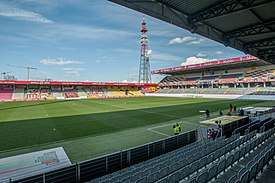2019–20 UEFA Women's Champions League
 The Franz Horr Stadium in Vienna will host the final | |
| Tournament details | |
|---|---|
| Dates |
Qualifying round: August 2019 Knockout phase: September 2019 – May 2020 |
| Teams |
Knockout phase: 32 Total: Maximum 68 (from Maximum 55 associations) |
The 2019–20 UEFA Women's Champions League will be the 19th edition of the European women's club football championship organised by UEFA, and the 11th edition since being rebranded as the UEFA Women's Champions League.
The final will be held at the Franz Horr Stadium in Vienna, Austria.[1]
Association team allocation
A maximum of 68 teams from 55 UEFA member associations are eligible to participate in the 2019–20 UEFA Women's Champions League. The association ranking based on the UEFA league coefficient for women is used to determine the number of participating teams for each association:
- Associations 1–12 each have two teams qualify.
- All other associations, should they enter, each have one team qualify.
- The winners of the 2018–19 UEFA Women's Champions League are given an additional entry if they do not qualify for the 2019–20 UEFA Women's Champions League through their domestic league.
Association ranking
For the 2019–20 UEFA Women's Champions League, the associations are allocated places according to their 2018 UEFA league coefficients for women, which takes into account their performance in European competitions from 2013–14 to 2017–18.
|
|
|
- Notes
- TH – Additional berth for title holders
- NR – No rank (association did not enter in any of the seasons used for computing coefficients)
- DNE – Did not enter
Distribution
The format of the competition remains unchanged from previous years, starting from the qualifying round (played as mini-tournaments with four teams in each group), followed by the knockout phase starting from the round of 32 (played as home-and-away two-legged ties except for the one-match final).
Unlike the men's Champions League, not every association enters a team, and so the exact number of teams entering in each round (qualifying round and round of 32) can not be determined until the full entry list is known. In general, the title holders, the champions of the top 12 associations, and the runners-up of highest-ranked associations (exact number depending on the number of entries) receive a bye to the round of 32. All other teams (runners-up of lowest-ranked associations and champions of associations starting from 13th) enter the qualifying round, with the group winners and a maximum of two best runners-up advancing to the round of 32.
Teams
An association must have a eleven-a-side women's domestic league (or in special circumstances, a women's domestic cup) to enter a team.
- Legend
- TH: Women's Champions League title holders
- CH: Domestic league champions
- RU: Domestic league runners-up
- CC: 2019 UEFA women's club coefficients.[2]
| Entry round | Teams | |||
|---|---|---|---|---|
| Round of 32 | ||||
| Round TBD | ||||
| Qualifying round | ||||
- Notes
- ^ Russia (RUS): Ryazan-VDV (CC: 14.580) have qualified for the 2019–20 UEFA Women's Champions League as top two of the 2018 Russian Championship.
- ^ Scotland (SCO): Glasgow City (CC: TBD) and Hibernian (CC: TBD) have qualified for the 2019–20 UEFA Women's Champions League as top two of the 2018 Scottish Women's Premier League.
See also
References
- ↑ "Vienna to host 2020 Women's Champions League final". UEFA.com. 24 May 2018.
- ↑ "Women's club coefficients". UEFA.com. Union of European Football Associations. 10 August 2018. Retrieved 10 August 2018.
- ↑ "LSK Kvinner ble seriemester: – Litt uvirkelig". vg.no. 9 September 2018.
- ↑ Anton Ingi Leifsson (17 September 2018). "Breiðablik Íslandsmeistari í sautjánda sinn". Vísir.is (in Icelandic). Retrieved 17 September 2018.
- ↑ "#DanskeWomensPrem : Linfield take title after dramatic fightback". shekicks.net. 29 September 2018. Retrieved 29 September 2018.
- ↑ "Rīgas Futbola skola sesto reizi pēc kārtas kļūst par Latvijas čempioni". Latvian Football Federation. 23 July 2018.